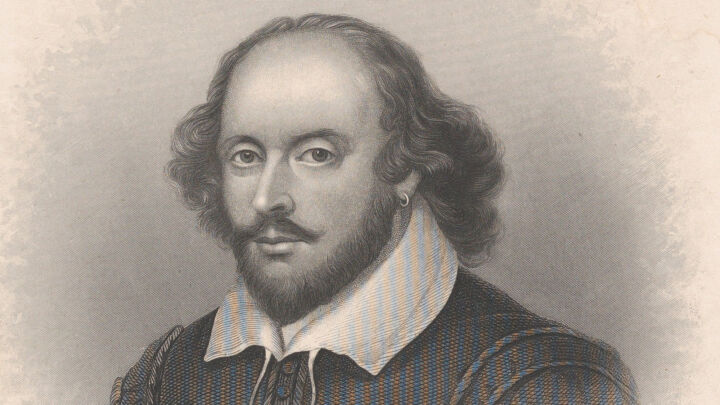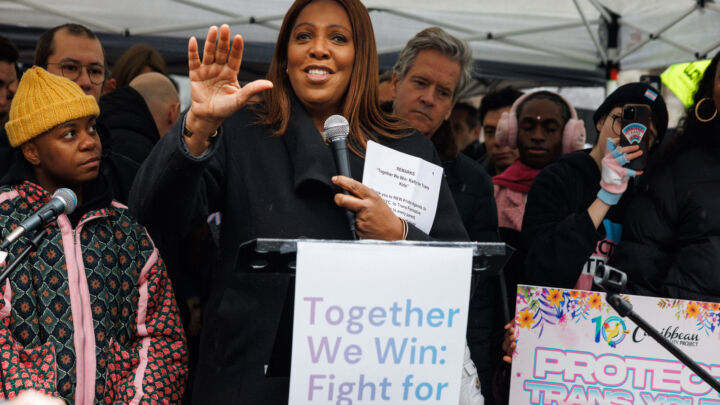Why was a teenage footballer punished for knowing what a woman is?
The FA has been handing out bans to girls who questioned why bearded men were on their pitches.

Want unlimited, ad-free access? Become a spiked supporter.
It turns out that an 18-year-old amateur footballer called Cerys Vaughan has more balls than the entire English Football Association (FA). After being smeared as transphobic and slapped with a six-match ban last year, the young player has now gone public about the ordeal she faced.
In July 2024, during a women’s match in the Greater Manchester Women’s League Division Two, Vaughan spotted something off on the opposing team – namely, ‘a bearded’ opponent playing for the ‘inclusive’ Manchester Laces. She asked the player, ‘Are you a man?’, and then questioned the referee about the safety of women playing against men. Vaughan was swiftly accused of transphobia and reported to ‘anti-discrimination’ group Kick It Out, which promptly triggered a local FA investigation.
Last October, this investigation resulted in a six-match ban for Vaughan. At just 17 years old at the time, she was left fearing even more punishment and worried that this would have an impact on her education. She was studying A-Level PE, which required a practical element linked to her playing football. Throughout her ordeal, she was treated like a thoughtcriminal. One three-hour online interrogation left her in tears.
Eventually, Vaughan was able to appeal her ban and the board admitted she hadn’t been given a fair hearing. Her accuser quietly withdrew the complaint against her. Then, in a moment of divine timing, mere minutes after she was told that the case against her had been dropped, the Supreme Court ruled that single-sex spaces are lawful and must be protected. Suddenly, the FA’s rulebook was not just scientifically questionable, but also unlawful and unravelling. The FA quickly announced that, from June, men will not be permitted to identify into women’s teams.
Vaughan is wonderfully unapologetic. When asked by the BBC at the weekend whether she had any ‘sympathy’ for transgender women who have been booted from the women’s game, she replied, with refreshing honesty, ‘No’. She then reminded the interviewer that women have the right to play their own sports. She also refused to apologise for referring to her ‘bearded’ opponent as ‘he’ rather than ‘she’.
Vaughan wasn’t even the only teenage girl who was bullied by the FA. In January this year, an 18-year-old – reportedly with learning difficulties – questioned whether some of the players on the opposing team might be trans. She asked something along the lines of: ‘Ref, have you checked if all of their players are eligible to play? Look at their keeper and, for example, their No10 is obviously a man.’ For this, she was banned for six games, forced to undergo an ‘online education course’ and her club was handed seven disciplinary points.
Ironically, in February this year, the FA had the gall to launch a supposedly feminist campaign called ‘Made for this Game’ to empower ‘women and girls to take their rightful place on the pitch’. Apparently, this doesn’t apply to women and girls who dare ask who else might be on the pitch with them.
Perhaps unsurprisingly, not one footballer with a public profile has spoken up for Vaughan, or the other young woman punished for noticing reality. Surely, it can’t be because there are no players who understand the difference between male and female bodies. It seems there is an omertà around this topic, where fear and shame keep the truth buried.
Despite the progress so far made as a result of the Supreme Court ruling, backing ‘trans rights’ is still a safe but cheap stunt for the brainless or gutless. Last month, Manchester City’s Kerstin Casparij kissed her trans-flag wristband after scoring and dedicated her goal to ‘trans people’. Then, earlier this month, former England star Anita Asante accepted an award with a syrupy pledge to the trans community: ‘I see you, I support you, I’m with you.’
Let’s be clear: it’s not trans players who are being marginalised and excluded, but women and girls like Vaughan. Their stories don’t fit the carefully curated posturing of nice guys like Gary Lineker and Neville Southall – wealthy, retired from the sport, yet still too spineless to defend the teenage girls being punished for telling the truth.
All Vaughan wanted was a fair game. But she was kicked off the pitch for stating what everyone knows but few dare to say – that women’s football is for women, The FA has disgraced itself, as has the professional footballing world. Meanwhile, players like Vaughan have scored a goal for women everywhere.
Jo Bartosch is a journalist campaigning for the rights of women and girls.
£1 a month for 3 months
You’ve hit your monthly free article limit.
Support spiked and get unlimited access.
Support spiked – £1 a month for 3 months
spiked is funded by readers like you. Only 0.1% of regular readers currently support us. If just 1% did, we could grow our team and step up the fight for free speech and democracy.
Become a spiked supporter and enjoy unlimited, ad-free access, bonus content and exclusive events – while helping to keep independent journalism alive.
———————————————————————————————————————————–
Exclusive January offer: join today for £1 a month for 3 months. Then £5 a month, cancel anytime.
———————————————————————————————————————————–
Monthly support makes the biggest difference. Thank you.











Comments
Want to join the conversation?
Only spiked supporters and patrons, who donate regularly to us, can comment on our articles.